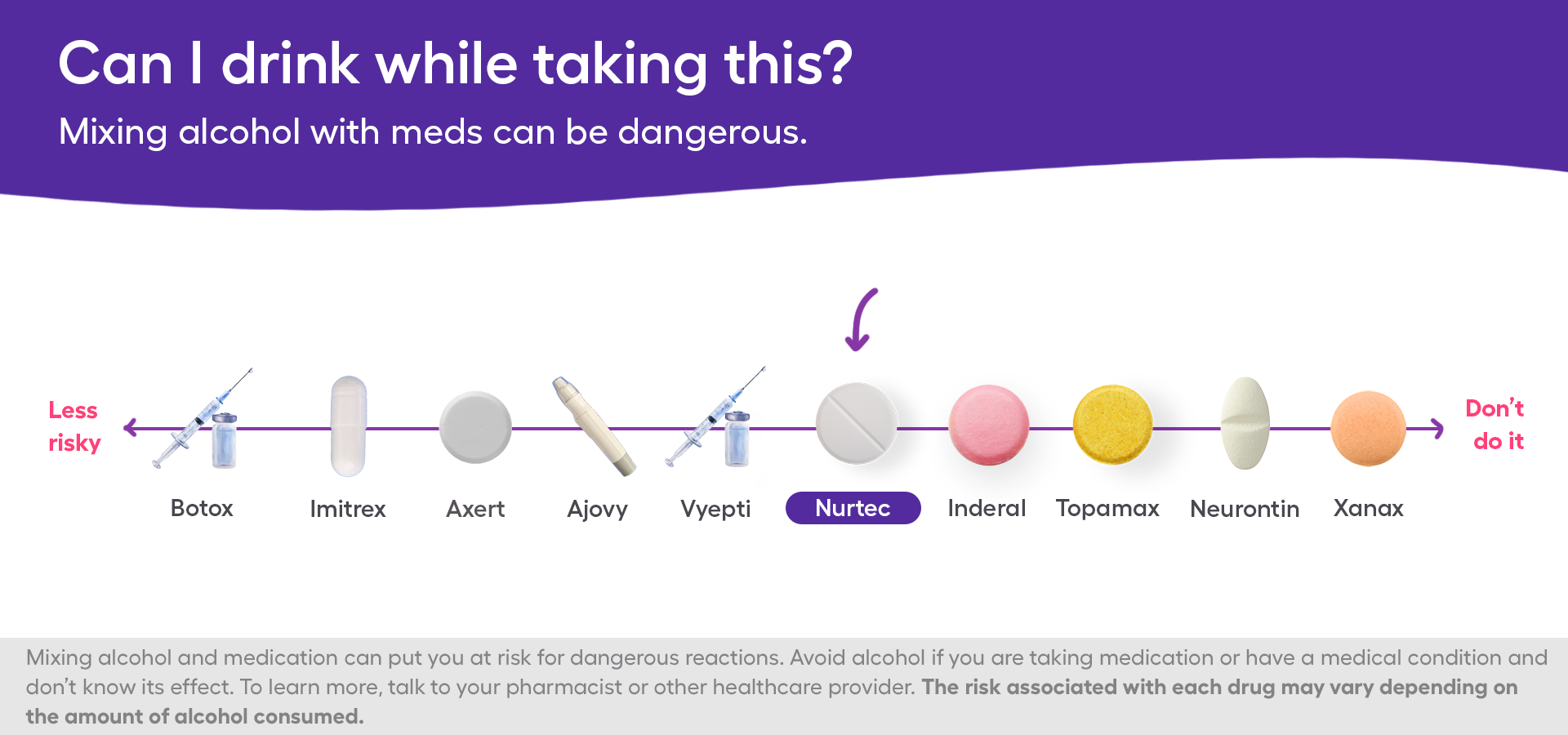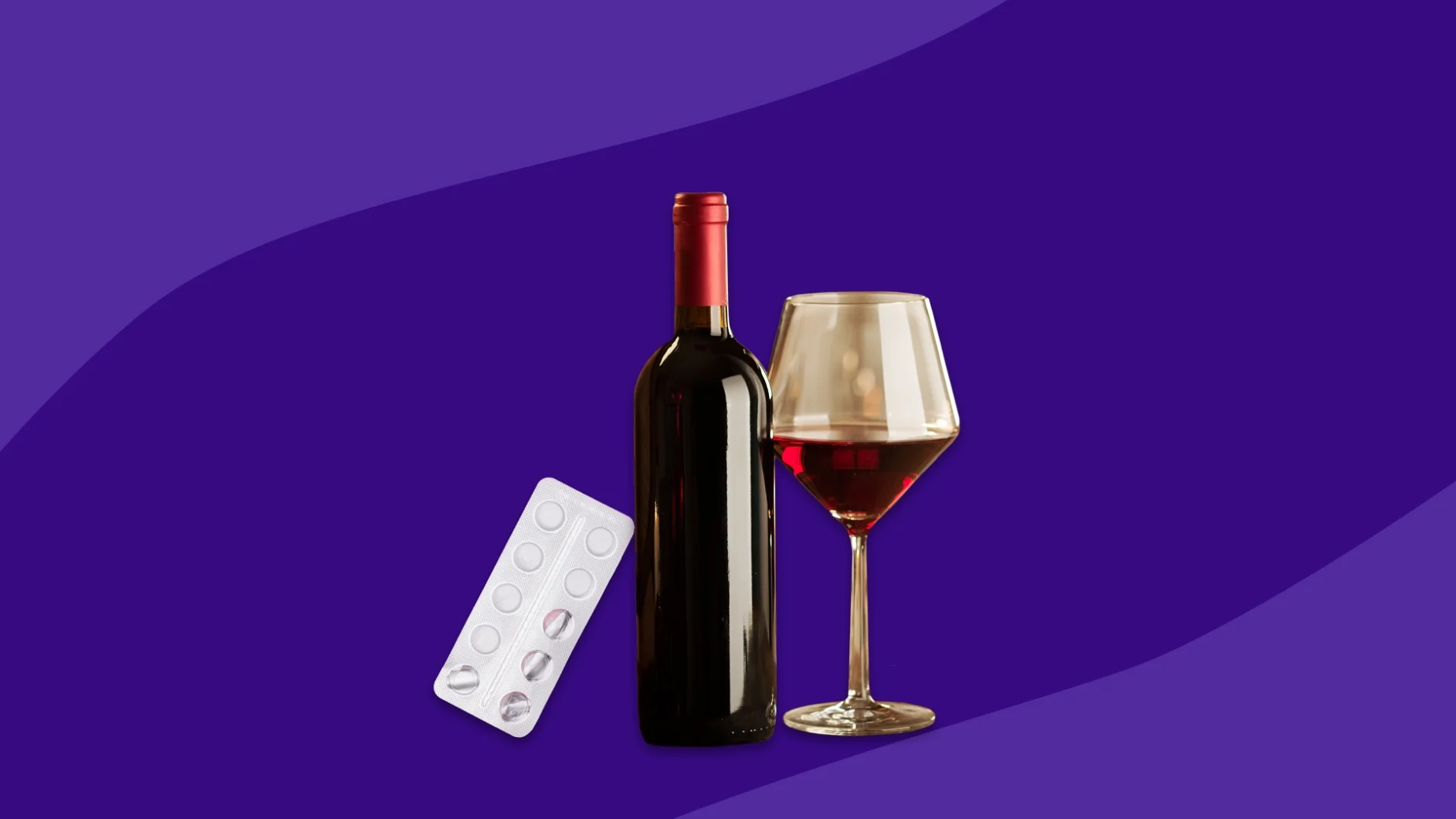Key takeaways
Nurtec ODT treats and prevents migraines, but mixing it with alcohol can worsen migraine symptoms for some.
Alcohol can trigger migraines and increase Nurtec side effects like nausea and stomach pain.
To reduce the risks of side effects, wait two to three days after taking your last dose of Nurtec before consuming alcohol.
Consult your healthcare provider before drinking alcohol with Nurtec, especially if you have liver problems.
You may have just popped a Nurtec ODT pill, ready to sip on some wine and relax after a long day. Suddenly, it hits you: “Can I even mix these two?” That moment of panic is all too familiar for many. Nurtec is a prescription drug that is FDA approved for managing migraine attacks and preventing episodic migraine, but it might not always pair with an evening drink. Why? For some people, alcohol itself can trigger migraines, which is what you’re trying to avoid in the first place. That being said, you may be able to take Nurtec ODT and drink in moderation—with a healthcare provider’s approval—if you understand how alcohol affects your body and pay attention to how you feel.
Can you drink while taking Nurtec?
It’s not typically recommended to drink alcohol while taking Nurtec (rimegepant) for the treatment of migraines. Alcohol can be a trigger for migraines and might worsen the symptoms in some people. Drinking alcohol could also make certain side effects of Nurtec ODT more noticeable.
Some healthcare providers may allow moderate drinking with Nurtec. This typically means that women can consume up to one drink per day, while men can have up to two drinks per day.

What happens if you mix Nurtec and alcohol?
Nurtec doesn’t directly interact with alcohol. However, this doesn’t mean combining them is risk-free. Drinking after taking one of these orally disintegrating tablets can have three main negative effects:
1. Decreased efficacy
Alcohol can be a trigger for migraines, which Nurtec aims to prevent or treat. Drinking alcohol might reduce the effectiveness of Nurtec ODT or worsen migraine symptoms. Certain types of alcohol, like red wine, are more likely to cause headaches than others. The reason is that they contain compounds like histamines and tannins, which may cause or worsen migraines.
Different people have different reactions to alcohol. Some might experience a migraine after just one drink, while others might not have any issues. It’s important to know that while alcohol might not directly cause a migraine for everyone, it can still be a risk factor for many.
Factors to consider:
- Type of drink: Certain drinks can trigger migraines more easily.
- Quantity: More alcohol can increase the risk.
- Individual sensitivity: Not everyone reacts the same way to alcohol.
If you know your triggers, you can better manage and potentially reduce how often you experience migraines. Keep track of your alcohol intake, especially if you suspect a link with headaches.
2. Increased side effects
The most common side effects of Nurtec ODT include:
- Nausea
- Stomach pain
- Indigestion
Drinking alcohol can upset your stomach, often due to the effects of alcohol itself and sometimes the excess sugar in certain alcoholic beverages. More specifically, alcohol can irritate the stomach lining, leading to inflammation and discomfort, causing more nausea and stomach pain. As a result, alcohol might make you feel worse if you’re taking Nurtec.
3. Increased liver strain
Nurtec is mainly processed by the liver. However, it has not been linked to significant liver damage. Even though mild increases in liver enzymes have occurred in some people, these instances are similar to those seen in people given a placebo.
Alcohol is known to affect liver function, especially in large amounts over long periods. For those using Nurtec, drinking alcohol might add extra stress to the liver. Although Nurtec itself is not associated with acute liver damage, combining it with alcohol could potentially increase risks because the liver metabolizes both substances.
People who have liver problems, especially those caused by drinking too much alcohol, may need to take a reduced dose or avoid Nurtec completely.
Are certain people at greater risk of side effects?
Some individuals may experience more serious side effects than others when taking Nurtec ODT. People with liver or kidney problems should discuss their medical history with their healthcare provider before starting the medication. These problems may affect how the body processes the drug, potentially increasing the risk of side effects.
Pregnant women or those planning to become pregnant also need to use caution. Although it’s unknown how Nurtec ODT affects unborn babies, there is a pregnancy registry called MONITOR to track health effects. Pregnant women can contact the registry for more information or assistance in enrolling.
For those who are breastfeeding, small amounts of Nurtec ODT may pass into breast milk. New mothers should consult their healthcare providers for medical advice on their babies’ best feeding options and discuss the potential risks involved.
How long after taking Nurtec can you drink alcohol?
Nurtec ODT gets processed and removed from the body over time. The term “half-life” refers to how long it takes for half the drug to be cleared from the bloodstream. For rimegepant, this time is about 11 hours. It’s a key factor when considering alcohol intake after taking Nurtec.
Complete elimination of a drug generally takes around five half-lives. In the case of rimegepant, this can be around 55 hours. Thus, to be cautious, it might be wise to wait at least two to three days after taking your last dose of Nurtec ODT before drinking alcohol.
As everyone’s body processes medications differently, how long it takes for Nurtec to leave your system can vary. Factors like your age, medical conditions, overall health, and how well your liver works can all play a role.
Nurtec ODT interactions
In addition to alcohol, there are other things you should avoid when taking Nurtec ODT to prevent drug interactions. Because of potential interactions, you might need to avoid taking some other medications with Nurtec ODT or wait at least 48 hours after taking another medication before using Nurtec ODT.
Avoid combining Nurtec with CYP3A4 inhibitors, such as certain antibiotics and antifungals, because they can raise rimegepant levels, leading to side effects. In addition, using Nurtec with CYP3A4 inducers, like certain anticonvulsants and Rifadin (rifampin), may reduce its effectiveness. Potent P-gp inhibitors like Cordarone (amiodarone) and Sandimmune (cyclosporine) can significantly raise rimegepant levels, so it’s recommended to avoid this combination. Watch out for grapefruit juice and certain supplements with Nurtec. Grapefruit can increase rimegepant levels, which may cause more side effects. Tell your healthcare provider about any supplements or over-the-counter (OTC) medications you use to prevent unwanted interactions.
Serious allergic reactions can occur. If you experience symptoms like trouble breathing, swelling of the face, or a rash, you should stop taking Nurtec immediately and seek medical help. The medication is contraindicated in people with known allergies to its ingredients.
Which migraine medications are not affected by alcohol?
Common OTC options like Tylenol (acetaminophen) and Advil (ibuprofen) generally do not have known interactions with alcohol, but caution is still recommended. Combining these medications with alcohol may increase the risk of liver damage or stomach irritation.
Other medications for migraines that may interact with alcohol include the following:
- Triptans, such as Imitrex (sumatriptan), Zomig (zolmitriptan), and Axert (almotriptan)
- Ergots, such as Ergomar (ergotamine) and Cafergot (ergotamine/caffeine)
- Anticonvulsants, such as Neurontin (gabapentin) and Topamax (topiramate)
- Beta blockers, such as Inderal (propranolol) and Tenormin (atenolol)
- OnabotulinumtoxinA (Botox)
Alcohol may affect how these drugs work in the body or increase side effects. Even if there are no direct interactions, alcohol itself might trigger migraines, making these medications less effective.
When exploring migraine treatment options, you may want to weigh the benefits and risks of mixing these drugs with alcohol. Read the prescribing information and follow the guidance of healthcare professionals to manage potential interactions.
The bottom line
Nurtec ODT is a brand-name medication that treats and prevents migraines by blocking calcitonin gene-related peptide (CGRP), a protein in the brain involved in migraine attacks. Mixing Nurtec ODT with alcohol is generally not recommended, as alcohol can trigger migraines and may worsen certain side effects of the medication. Although there are no direct interactions between Nurtec and alcohol, it’s important to consult a healthcare provider before drinking to minimize risks, especially for individuals with liver problems. Waiting at least two to three days after taking Nurtec before consuming alcohol may help reduce potential side effects.
- Nurtec ODT highlights of prescribing information, U.S. Food and Drug Administration (2022)
- Alcohol as a trigger of migraine attacks in people with migraine. Results from a large prospective cohort study in English‐speaking countries, Headache (2022)
- Drink alcohol only in moderation, U.S. Department of Health and Human Services (2024)
- Alcohol and gut-derived inflammation, Alcohol Research: Current Reviews (2017)
- Rimegepant, LiverTox (2021)
- Alcohol-associated liver disease, John Hopkins Medicine (2024)
- The migraine observational Nurtec® pregnancy registry (MONITOR), Pfizer (2024)
- Rimegepant: A review in the acute treatment and preventive treatment of migraine, CNS Drugs (2023)
- Ask the doctor: What causes red wine headaches?, Harvard Health (2023)




